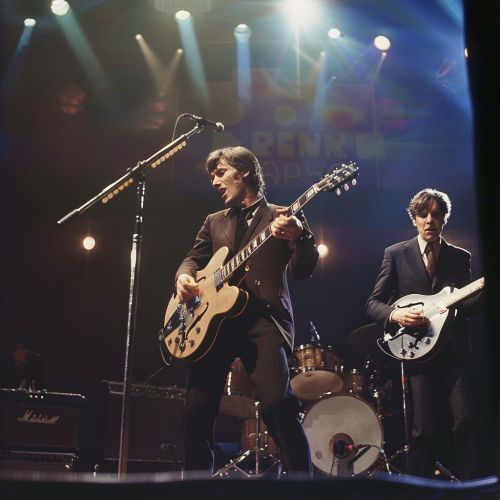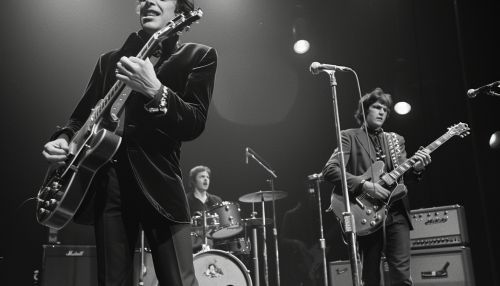The Kinks
Early Years and Formation
The Kinks, an English rock band formed in Muswell Hill, North London, in 1963, were one of the most influential rock acts of the 1960s. The original lineup consisted of brothers Ray and Dave Davies, bassist Pete Quaife, and drummer Mick Avory. The band was known for its distinctive sound, which combined elements of rock, rhythm and blues, and British music hall.
Ray Davies, the primary songwriter, was influenced by a wide range of musical styles, including American rock and roll, jazz, and traditional British music. His songwriting was characterized by its wit, social commentary, and keen observations of British life. Dave Davies, the lead guitarist, was known for his innovative guitar work, which included the use of power chords and distortion.
Breakthrough and Early Success
The Kinks achieved their first major success with the release of their third single, "You Really Got Me", in 1964. The song, with its distinctive riff and raw energy, became a hit in both the UK and the US, reaching number one on the UK Singles Chart and number seven on the Billboard Hot 100. This success was followed by a string of hit singles, including "All Day and All of the Night", "Tired of Waiting for You", and "A Well Respected Man".
Their early albums, such as "Kinks" (1964) and "Kinda Kinks" (1965), showcased the band's raw, energetic sound and Ray Davies' growing prowess as a songwriter. These albums featured a mix of original compositions and covers of American rhythm and blues songs.
Musical Evolution and Concept Albums
By the mid-1960s, The Kinks began to evolve musically, incorporating more sophisticated arrangements and exploring new themes in their lyrics. This period saw the release of some of their most critically acclaimed work, including the albums "Face to Face" (1966), "Something Else by The Kinks" (1967), and "The Kinks Are the Village Green Preservation Society" (1968).
"Face to Face" marked a significant departure from their earlier work, featuring more complex song structures and a greater emphasis on social commentary. Songs like "Sunny Afternoon" and "Dandy" showcased Ray Davies' ability to craft incisive, satirical lyrics.
"The Kinks Are the Village Green Preservation Society" is often regarded as the band's masterpiece. The album is a nostalgic and affectionate look at English rural life, filled with richly detailed character studies and evocative imagery. Despite its initial commercial failure, it has since been recognized as one of the greatest albums of all time.


Commercial Decline and Artistic Resurgence
The late 1960s and early 1970s were a period of commercial decline for The Kinks, as their music became increasingly experimental and less accessible to mainstream audiences. Albums like "Arthur (Or the Decline and Fall of the British Empire)" (1969) and "Lola Versus Powerman and the Moneygoround, Part One" (1970) received critical acclaim but failed to achieve significant commercial success.
However, the band experienced a resurgence in the early 1970s with the release of the single "Lola", which became a major hit in both the UK and the US. The accompanying album, "Lola Versus Powerman and the Moneygoround, Part One", was a satirical look at the music industry and featured some of Ray Davies' most biting lyrics.
Theatrical Period and Concept Albums
In the mid-1970s, The Kinks embarked on a series of ambitious concept albums and rock operas, including "Preservation Act 1" (1973), "Preservation Act 2" (1974), and "Soap Opera" (1975). These albums featured elaborate storylines and theatrical elements, reflecting Ray Davies' interest in combining rock music with other forms of artistic expression.
While these projects were artistically ambitious, they were not commercially successful, and the band's popularity continued to wane. However, they remained a respected and influential force in the music industry, and their live performances continued to draw enthusiastic audiences.
Later Years and Legacy
The Kinks continued to release albums and tour throughout the 1980s and 1990s, although their commercial success was limited. Albums like "Give the People What They Want" (1981) and "State of Confusion" (1983) received positive reviews and produced minor hits, but the band struggled to recapture the widespread popularity of their earlier years.
Despite these challenges, The Kinks' influence on subsequent generations of musicians is undeniable. Their innovative use of power chords and distortion helped to shape the sound of hard rock and punk rock, and their keen social observations and satirical lyrics have inspired countless songwriters.
